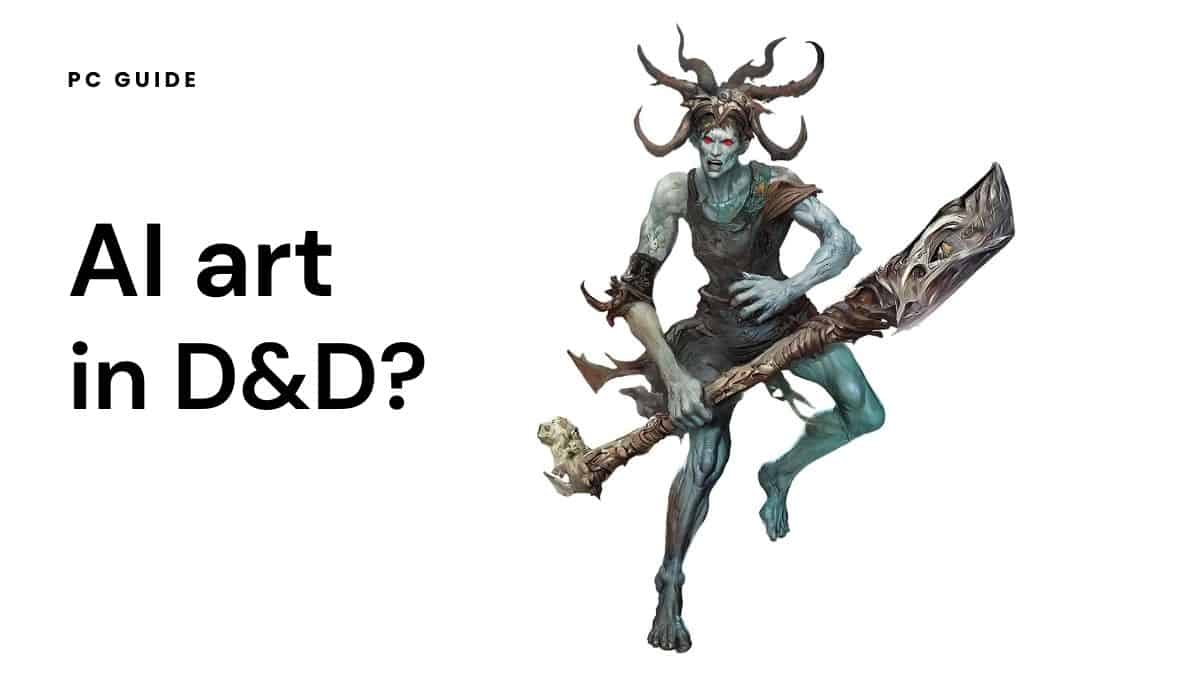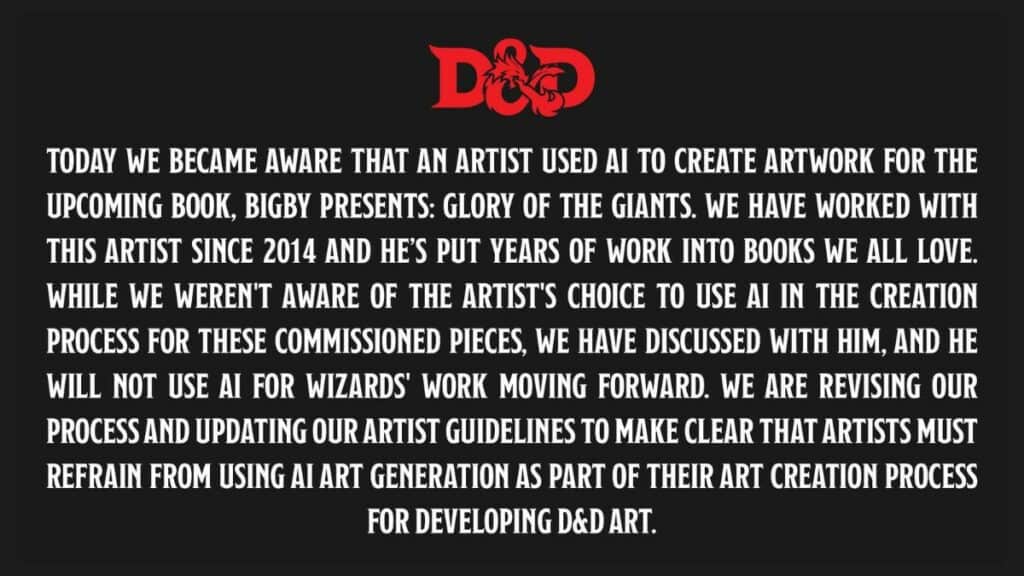D&D publisher WotC under fire for AI art

Table of Contents
Wizards of the Coast (Dungeons & Dragons and Magic the Gathering) are under fire for the use of AI-generated artwork in upcoming book Bigby Presents: Glory of the Giants. The recent controversy centres around one concept artist in particular, and doesn’t appear to be a systemic issue. It is, however, part of a much wider picture being painted across multiple industries. Just why is everyone up in arms about this WotC AI art?
Does D&D use AI art? – WotC AI art
The latest companion book from the publisher of the popular Dungeons & Dragons franchise has caught the eye of skeptical D&D fans on Twitter. In response to the disappointment, WotC (Wizards of the Coast) released a statement through the D&D Beyond Twitter profile. The tabletop-gaming giant claims that it had no prior knowledge of AI being used, assuring the public that it is tightening D&D artist guidelines regarding the use of AI tools like art generators. AI-generated art will have no place in future wizards’ work, it seems.

Essential AI Tools
Try “What is ChatGPT – and what is it used for?” or “How to use ChatGPT on mobile” for further reading on AI.
On August 5th, concept art contributor Ilya Shkipin admitted in a now-deleted tweet that AI was used to “generate certain details or polish” but assures that the artwork was merely AI-assisted. They maintain that AI is simply part of their art creation process, not the entirety of it.
Shkipins’ statement read “There is recent controversy on whether these illustrations I made were ai generated. AI was used in the process to generate certain details or polish and editing. To shine some light on the process I’m attaching earlier versions of the illustrations before ai had been applied to enhance details. As you can see a lot of painted elements were enhanced with ai rather tham generated from the ground up.” [sic]
WotC has elected not to cut ties with the artist, despite his prolific use of AI models like Pika Labs AI and his background in NFTs – an industry which sparked the same debate in 2021. Shkipin sells artwork on NFT marketplace Superrare, a digital artwork platform on the Ethereum blockchain.
Where to order Bigby Presents: Glory of the Giants
Bigby Presents: Glory of the Giants is now available for preorder, as a digital download or physical bundle for $59.95 on the D&D website. The latter includes a hardcover book of monster descriptions and lore. The book itself, set for release on August 15th, has likely already been printed. It’s unclear whether digital versions of the book will feature updated art to replace the controversial submissions.
Does Magic The Gathering use AI art?
This outcry will no doubt have a knock-on effect across all intellectual property under Hasbro subsidiary Wizards of the Coast. The use of AI-generated art is a hotly contested issue in the creative community, by professionals and fans alike.
As you can imagine, fans of the role playing game for which WotC is best known are disappointed that the telltale glitches of AI slipped through the cracks of quality control. D&D art illustrations have always been a much-loved aspect of the franchise. The imaginative artwork from D&D artists brings invaluable nostalgia to the tabletop game, and often effects the real-word value of cards in the trading card game Magic the Gathering.
Thankfully, one concept artist does not a franchise make. The imagery used in the novels, rulebooks, cards, and companion content under the WotC brand will likely be free from artificial intelligence from this point on.
Is it OK to use AI-generated art? – SAG-AFTRA and the Hollywood strike
A number of industries are facing simultaneous backlash for related labor concerns, including the film and music industries. The ongoing Hollywood strike involving Writers Guild of America and SAG-AFTRA has the use of AI technology at its core. In a move concerningly identical to Black Mirror episode Joan is Awful, SAG-AFTRA (The Screen Actors Guild – American Federation of Television and Radio Artists) claim that Hollywood wants to scan actors and, following one days pay, use that likeness in perpetuity and with no consent or future compensation.
Jeffrey Bennett, General Counsel of SAG-AFTRA, released the following statement. “SAG-AFTRA maintains that the right to digitally replicate a performer’s voice or likeness to substantially manipulate a performance, or to create a new digital performance, is a mandatory subject of bargaining. In addition, the use of performer's voice, likeness or performance to train an artificial intelligence system designed to generate new visual, audio, or audiovisual content is a mandatory subject of bargaining.”
The music industry's Recording Academy is revising its Grammy Awards protocols to ease similar concerns with AI-generated music. Visual artists are also at odds with artificial intelligence technology, image-generators in particular. There is a fear that AI will replace them, putting them out of work. Greg Rutkowski numbers among the industry legends known for classic D&D art. An outspoken critic of AI art, Rutkowski himself has been the victim of unflattering imitation more than even Picasso.
